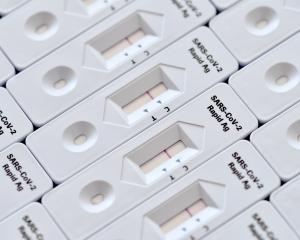Dunedin Hospital has dramatically increased its number of ventilators and has plans in place to deploy them throughout the building should a Covid-19 resurgence happen in the South.
Before the pandemic, Dunedin Hospital had 12 reasonably new intensive care unit (ICU) ventilators, six due to go out of commission in the next three years and four due to go out of commission last year.
"We have subsequently taken receipt of 14 brand-new ventilators with additional ICU monitors and pumps which the Ministry of Health provided as part of their national surge capacity development," Southern District Health Board critical care director Craig Carr said.
Given the crisis, the four ventilators scheduled for decommissioning were being maintained and the six older machines were also being kept in peak working order.
"The Dunedin ICU therefore has a maximum surge capacity of 36 ventilated beds," Dr Carr said.
However, for it to reach that number, permission would have to be given for the as yet uncommissioned second stage of the critical care unit to be used.
That ward was due to open 10 months ago but remains in mothballs as engineers struggle to repair problems with its ventilation system.
Should an emergency or exceptional circumstances occur, and clinicians were granted access to the wards, that would give the SDHB 22 beds for Covid-19 patients.
"We would move non-Covid patients to the gastroenterology suite recovery unit on a separate floor, giving us eight beds of critical care there, while maintaining excellent separation of Covid-positive and Covid-negative patients," Dr Carr said.
"This separation would also facilitate us keeping good separation of more vulnerable at-risk staff from infected patients."
If the hospital was being overwhelmed with Covid-19 patients, six more intensive care beds would be set up in theatre recovery rooms.
"Having the ventilators, pumps and monitors is only one part of the equation. Once you have the equipment to use, the next greatest issue is having appropriately trained staff to care for the patients needing the equipment to support their lives while receiving treatment," Dr Carr said.
"You also require sufficient oxygen and compressed air to run the respiratory support equipment, something the Ministry of Health has been working hard to underpin with DHBs throughout 2020."
The SDHB did have plans for non-ICU staff to help out if required, but he hoped New Zealand could avoid what had happened in some other counties, where Covid-19-positive staff had been called in to work due to patient demand, Dr Carr said.
"This illustrates how desperate things can become and serves as a warning to us to make sure we minimise any outbreaks and flatten the curve to avoid the health services becoming overwhelmed."
Advertisement













